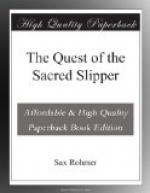I turned to Carneta. She, too, had been watching. Now her gaze met mine.
“Mr. Isaacs!” she said; and her voice was less musical than usual. “His chauffeur, who learned his business in Cairo, is probably the only one of his servants who remains in England.”
“What!” I began—and said no more.
Where the road upon which we stood wound down into the valley and lost itself amid the trees surrounding the Gate House, the car suddenly appeared again, and began to mount the slope toward us!
“Heavens!” whispered Carneta. “He may have seen us—with glasses! Quick! Let us walk back until the hill-top conceals us; then we must hide somewhere!”
I shared her excitement. Without a moment’s hesitation we both turned and retraced our steps. Twenty paces brought us to a spot where a stack of mangel wurzels stood at the roadside.
“This will do!” I said.
We ran around into the field, and crouched where we could peer out on the road without ourselves being seen. Nor had we taken up this position a moment too soon.
Topping the slope came a light-weight electric, driven by a man who, in his spruce uniform, might have passed at a glance for a very dusky European. The car had a limousine back, and as the chauffeur slowed down, out from the open windows right and left peered the solitary occupant.
He had the cast of countenance which is associated with the best type of Jew, with clear-cut aquiline features wholly destitute of grossness. His white beard was patriarchal and he wore gold-rimmed pince-nez and a glossy silk hat. Such figures may often be met with in the great money-markets of the world, and Mr. Isaacs would have passed for a successful financier in even more discerning communities than that of Cadham.
But I scarcely breathed until the car was past; and, beside me, my companion, crouching to the ground, was trembling wildly. Fifty yards toward the village Mr. Isaacs evidently directed the man to return.
The car was put about, and flashed past us at high speed down into the valley. When the sound of the humming motor had died to something no louder than the buzz of a sleepy wasp, I held out my hand to Carneta and she rose, pale, but with blazing eyes, and picked up her camera case.
“If he had detected us, everything would have been lost!” she whispered.
“Not everything!” I replied grimly—and showed her the revolver which I had held in my hand whilst those eagle eyes had been seeking us. “If he had made a sign to show that he had seen us, in fact, if he had once offered a safe mark by leaning from the car, I should have shot him dead without hesitation!”
“We must not show ourselves again, but wait for dusk. He must have seen us, then, on the hilltop, but I hope without recognizing us. He has the sight and instincts of a vulture!”
I nodded, slipping the revolver into my pocket, but I wondered if I should not have been better advised to have risked a shot at the moment that I had recognized “Mr. Isaacs” for Hassan of Aleppo.




